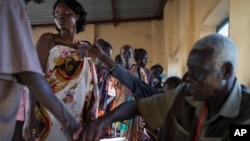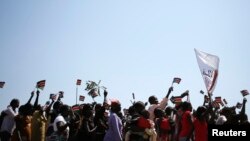Some residents in the disputed Abyei region are voting for a second day on whether to join Sudan or South Sudan, both of which claim the territory.
The three-day referendum, which began Sunday, is not sanctioned by either country's government.
Only members of the South Sudan-allied Ngok Dinka ethnic group are participating in the exercise. Nomads from the Sudan-allied Misseriya tribe say they will not recognize the results, which are expected on October 31.
A referendum on Abyei was originally scheduled for January 2011 but the two Sudans have been unable to agree who is eligible to vote. The countries nearly went to war that year because of disputes over Abyei, oil, and borders.
Referendum organizers say an estimated 65,000 people are registered to cast ballots at the 28 polling places.
Luka Biong, a spokesperson for the Abyei Referendum High Commission, told VOA that he hopes the vote will settle the final status of Abyei and bring peace to the disputed area.
"I hope this choice is going to be good for all the neighbors of the community of Abyei, whether the country they have chosen or the country they have rejected," he said. "I think the two countries will eventually benefit from the stability and peace in Abyei and from the [economic] development that we are going to see in Abyei. We hope it will add [something] to strengthen the good relationship between the two countries."
The status of the 10,000-square-kilometer area of Abyei has been in dispute since the signing of the 2005 Comprehensive Peace Agreement that ended more than 20 years of civil war in the once-unified Sudan.
Prized for its fertile land and oil reserves, Abyei is claimed by the north and south, and is currently under United Nations' administration.
The three-day referendum, which began Sunday, is not sanctioned by either country's government.
Only members of the South Sudan-allied Ngok Dinka ethnic group are participating in the exercise. Nomads from the Sudan-allied Misseriya tribe say they will not recognize the results, which are expected on October 31.
A referendum on Abyei was originally scheduled for January 2011 but the two Sudans have been unable to agree who is eligible to vote. The countries nearly went to war that year because of disputes over Abyei, oil, and borders.
Referendum organizers say an estimated 65,000 people are registered to cast ballots at the 28 polling places.
Luka Biong, a spokesperson for the Abyei Referendum High Commission, told VOA that he hopes the vote will settle the final status of Abyei and bring peace to the disputed area.
"I hope this choice is going to be good for all the neighbors of the community of Abyei, whether the country they have chosen or the country they have rejected," he said. "I think the two countries will eventually benefit from the stability and peace in Abyei and from the [economic] development that we are going to see in Abyei. We hope it will add [something] to strengthen the good relationship between the two countries."
The status of the 10,000-square-kilometer area of Abyei has been in dispute since the signing of the 2005 Comprehensive Peace Agreement that ended more than 20 years of civil war in the once-unified Sudan.
Prized for its fertile land and oil reserves, Abyei is claimed by the north and south, and is currently under United Nations' administration.

